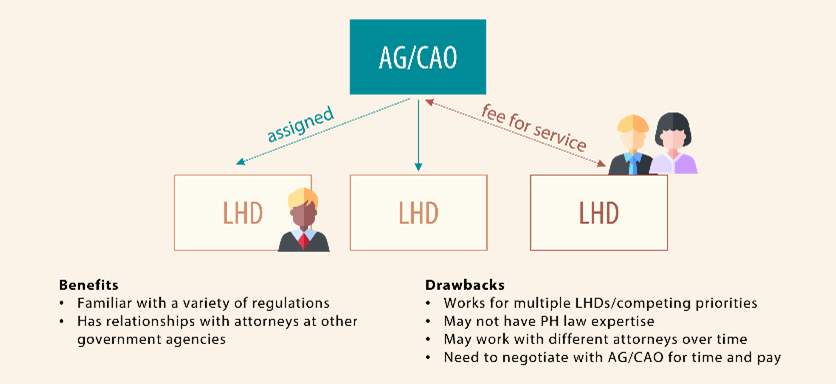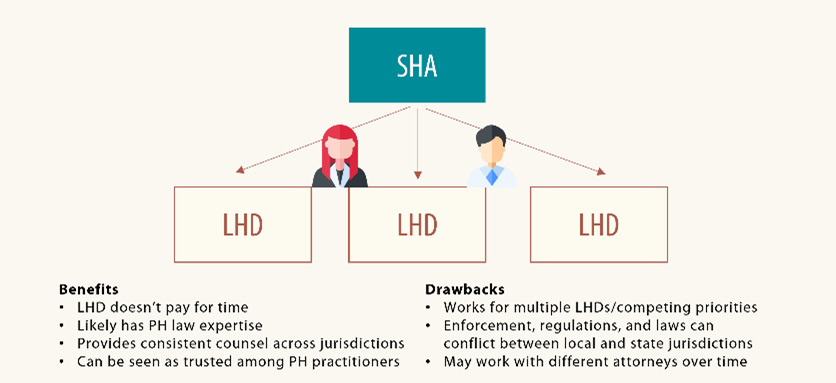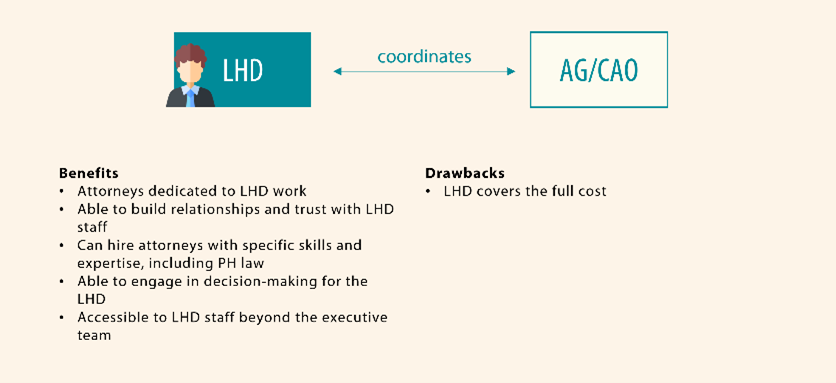Local health departments (LHDs) serve as one of the primary enforcers of state and local laws related to the health of their communities. While some employ dedicated public health attorneys to facilitate this essential function, many LHDs rely on non-specialized legal counsel. Despite these varied approaches to engaging legal professionals, we know attorneys provide a wide range of services that are critical to LHDs beyond litigation. These services can include advising on new policy, enforcing current regulations, and interpreting directives from federal and state authorities. Most importantly, public health attorneys offer a balanced approach to public health law by crafting policies that are defensible, enforceable, and protect population health while considering the perspectives of community members.
NACCHO worked with CDC’s Public Health Law Program to better understand the different forms of LHD-attorney partnership and the value dedicated counsel brings to public health. We conducted in-depth interviews with five health departments and gathered data in a short questionnaire from 26 additional LHDs. Most LHDs that engaged in our research represented suburban or urban jurisdictions, and six responding to the questionnaire had not engaged with an attorney within the prior year. Although our findings are not generalizable, this work begins to examine the benefits for LHDs partnering with an attorney and potential challenges that can result depending on the partnership structure.
Approaches for Engaging with Attorneys
The varied approaches LHDs use to engage with attorneys each have their own unique benefits and drawbacks (as represented in this infographic).
Working with an attorney employed by another government agency:
LHDs most often noted working with an attorney employed by their County Attorney’s Office (CAO) or Attorney General (AG), which can be either assigned to them or selected through a fee-for-service model.

- Benefits: In this structure, attorneys are often familiar with state, county, and local regulations. This is a result of their focus on a variety of issues beyond public health, including facilities management, public affairs, information technology, and procurement. Additionally, these attorneys can have relationships across several government agencies and LHDs, which allows them to provide a consistent interpretation of the law.
- Drawbacks: LHDs using this structure may work with different attorneys over time, which can be a hinderance to cultivating relationships and trust. In addition, LHDs often need to negotiate with the CAO or AG for the attorney’s time and pay—a barrier to partnering with an attorney quickly.
Working with attorneys hired by the state health agency (SHA):
Some LHDs—especially those with a state-governance model—engage with attorneys employed by their SHA, as described in this case by the South Carolina Department of Health.

- Benefits: In this structure, attorneys likely have public health expertise. Additionally, they can be seen as trusted advisors among LHD staff because attorneys that work across different LHDs over a long period of time build strong relationships with the “right” people to get jobs done efficiently.
- Drawback: There is the potential for political power to influence attorneys’ enforcement of public health policies in this structure. This is especially a risk when regulations and laws conflict between local and state jurisdictions.
Employing an attorney as an LHD staff member:
Although this seems to be the least common structure, a few LHDs employ their own public health attorney, who can coordinate with attorneys at other agencies.

- Benefits: This structure avoids many of the previously described drawbacks. In particular, staff attorneys are well versed in public health issues and dedicated to the LHD’s work rather than splitting time among many clients.
- Drawback: In this structure, the LHD covers much—if not all—of the costs associated with attorney fees. In this case of Nassau County Department of Health, the state reimburses 30% of the attorney’s salary while general LHD funds cover the rest.
Hiring independent legal counsel:
Small and rural LHDs may not have the financial capacity to hire an attorney as a staff member. In addition, they may not have the amount of work required to necessitate a full-time attorney staff position on their own. In these situations, LHDs can hire specialized independent legal counsel.

- Benefits: The benefits of this structure overlaps with the three described above. LHDs can seek private attorneys that are well versed in public health issues and can work with the same attorney over time, building a trusted relationship. In addition, independent legal counsel can be hired by several LHDs in one state, as is the case in Nebraska, so multiple jurisdictions receive consistent advice.
- Drawback: In addition to the LHD needing to cover the attorney’s fees in some cases, another drawback of this LHD-attorney relationship is that independent counsel may split their time among many LHDs and have competing priorities.
The Critical Role of the LHD-Attorney Relationship
Attorneys frequently advise LHDs on policy planning or implementing mandates to mitigate legal risk. However, attorneys provide LHDs a variety of services beyond acting as trusted advisors. For example, they can:
- modernize procurement and contracting processes,
- support data sharing agreements, requests, and compliance,
- write public health ordinances (e.g., isolation and quarantine),
- conduct permit and licensing activities,
- lead environmental health enforcement, and
- support litigation by representing the LHD in court and training staff asked to testify.
In instances where the attorney is a part of the LHD’s executive team, the attorney is a key player in the agency’s decision-making process. Additionally, attorneys can step in to fill other functions when health departments are short-staffed during a surge or emergency response. In one example, staff attorneys helped draft guidance related to COVID-19 and ensured consistent communication with the public.
Best Practices for Engaging with an Attorney
Although partnering with an attorney can take many forms, doing so is vital to supporting public health’s mission to protect the safety and wellbeing of the public. LHDs shared how they galvanized support for building an LHD-attorney relationship.
Demonstrate a reliance on attorneys to address timely public health issues:
- LHDs relied on attorneys to create and enforce politically charged mitigation policies during the COVID-19 pandemic.
- LHD leadership, decision-makers, and other stakeholders bought into an attorney partnership as a resource for court proceedings—whereby attorneys supported filings, testimony, evidence, etc.—and successful legal defense.
Develop a cost sharing agreement with other agencies:
- LHDs sharing associated costs with other LHDs or their CAO were able to more easily justify having an attorney. Although the attorney’s time was shared, the entities also had consistent counsel across time.
Highlight the value-add of attorney expertise beyond traditional roles:
- LHDs leveraged the extensive expertise attorneys can bring to outweigh the costs of legal fees. In one instance, a staff attorney updated the LHD’s legal practices and improved contracting standards—a valuable outcome generated by engaging an attorney outside of a litigation role.
Hire dedicated legal counsel, if that is the right approach for you:
- First, check what kind of representation state and local laws will allow for your LHD.
- Remain cognizant of actual or potential conflicts of interest, such as when the attorney represents multiple jurisdictions or two entities within the same jurisdiction (e.g., the county commissioners and LHD).
- At the end of the day, LHDs that hired a public health attorney received timely counsel, minimized exposure to legal risk, and built capacity for their staff to understand the law.
For tools and resources to engage with attorneys, visit NACCHO’s Public Health Law webpage.









